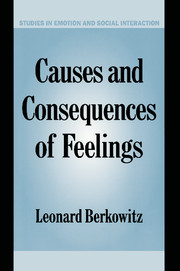Book contents
- Frontmatter
- Contents
- Acknowledgments
- Introduction
- Part I The Nature and Origin of Feelings
- Part II Feelings and Memory
- 3 Influences of Feelings on Memory
- 4 Personal Traumas and Memory
- Part III Affective Influences on Cognitive Processes
- Part IV Influencing Action
- Notes
- References
- Index
- Titles in the Series
4 - Personal Traumas and Memory
Published online by Cambridge University Press: 28 October 2009
- Frontmatter
- Contents
- Acknowledgments
- Introduction
- Part I The Nature and Origin of Feelings
- Part II Feelings and Memory
- 3 Influences of Feelings on Memory
- 4 Personal Traumas and Memory
- Part III Affective Influences on Cognitive Processes
- Part IV Influencing Action
- Notes
- References
- Index
- Titles in the Series
Summary
The previous chapter closed with an examination of people's recollections of frightening events that, more often than not, had happened to other persons. We now extend this topic by looking at memories of traumas in which the individuals themselves were severely threatened. Chapter 3 noted that emotion-arousing occurrences, or at least their central features, are often remembered quite well. Our main question here is whether there is a similar heightened memory for traumatic episodes. In other words, how well do people recall incidents in which they themselves are endangered physically or psychologically?
Much of our focus in seeking to answer this question will be on the notion of repression, the idea that the human mind frequently blocks unwanted memories, urges, and thoughts from conscious awareness. Because we're dealing with memory, this chapter will say nothing about whether one's forbidden desires are kept hidden in the depths of the unconscious, and will only consider the possibility that the mind often defends itself against pain and anxiety by preventing the conscious recall of earlier traumatic events.
Although the notion of repression is widely accepted, by many mental health specialists as well as by a good fraction of the broader public, it is actually a controversial idea for quite a few research-oriented psychologists. Much of the argument is centered on the well-publicized contention that a substantial number of people have repressed the sexual abuse they suffered in childhood. The chapter will review some of the reasons why several prominent researchers are troubled by this notion and by the more general thesis that we unconsciously are apt to forget our personal traumas.
- Type
- Chapter
- Information
- Causes and Consequences of Feelings , pp. 96 - 118Publisher: Cambridge University PressPrint publication year: 2000

